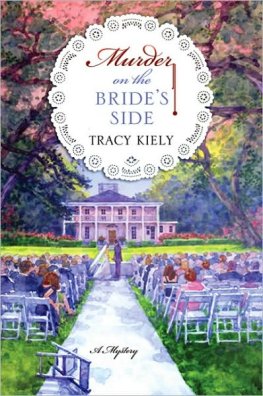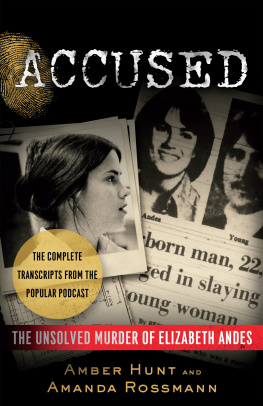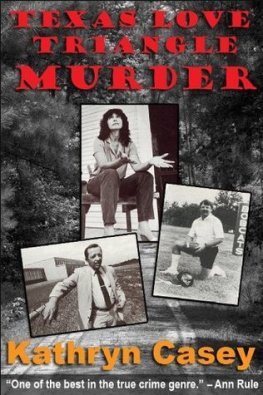WHO DID IT? JENS? OR ELIZABETH?
In her testimony in 1987 Elizabeth tried to persuade Judge Sweeney that she did not want Derek and Nancy dead. Only removed. Transported outside her realm. Taken off into space somewhere, like the characters in the movie Cocoon. Elizabeth was trying to draw a distinction between wanting to be rid of her parents and wanting to be rid of her parents. It did not work. In the end, it did not even matter. Elizabeth Haysom pleaded guilty to conspiring with Jens Soering to murder her parents. As far as the law was concerned she was in it up to her eyebrows. In 1990, her story changed subtly. While in 1987 she admitted guilt only to a limited degree, by 1990 she expanded her degree of responsibility. When she testified at Jenss trial she readily admitted that she had been manipulating her former lover from the early days of their relationship. The goal was to get him to murder her parents.
Which story was true? Who knows? Maybe events transpired in the fashion she described in 1990. Maybe not. Perhaps she was simply trying to tighten the noose around Jenss neck. The contradiction was typical of Elizabeth. She is the consummate and inveterate liar. The unconscious prevaricator frequently unable to tell fact from fiction. She lives, and has done so for a long time, in a world all her own.
Actually, as far back as 1987, two and a half years before Jenss trial, the evidence that she did in fact want her parents dead is stronger than the preceding text indicates. Her letters to Jens were far more explicit than she was willing to admit. This could be only partially demonstrated in this book because U.S. copyright law has been interpreted by thefederal appeals court in New York to prohibit quotation from a persons previously unpublished writing, even if that writing is part of the court record. What was presented was carefully selected and focused; a series of snapshots having to make do for a movie.
The real question is not whether she encouraged Dereks and Nancys murders, but why. And it may never be answered.
Rare indeed is the child who has not, at one time or another, harbored a desire to do away with one or both parents. Happily for the parents, very few actually do it. Elizabeth was an exception. Of course, there have been others. History is replete with instances of parricide. Everyone knows about Oedipus, who killed his father and married his mother. The Greeks also talked about Electra, Oedipuss gender-opposite. Obsessed with her relationship with her father, she encouraged her brother, Orestes, to kill their mother. And as recently as yesterdays headlines there was the case of Cheryl Pierson, the Long Island teenager who hired a classmate to kill her father.
But Elizabeths motive or motives are not nearly as apparent. Cheryl Pierson had her father killed, she said, because he had been sexually abusing her since she was eleven. Elizabeth passionately denied, on the stand, that Nancy had sexually abused her. Significantly, she did not specifically deny that an incestuous relationship existed. But that does not mean that one did. The key word in her testimony was abuse. Maybe in her mind the relationship that existed with her mother did not meet Elizabeths definition of that word. At one time she said she did have a sexual relationship with her mother. At another time she said she did not. Clearly she wanted Jens to believe that she did. But Elizabeth is the only one still alive who knows for sure, and she is not likely to say anymore at this stage. In any case, who would believe her now, no matter what she said on the subject ? It is not inconceivable that her intention all along was to obfuscate. Certainly she is intelligent enough to appreciate the benefits that confusion could offer her.
WHY ELSE WOULD SHE WANT TO BE RID OF HER PARENTS ? Bitterness, perhaps. Elizabeth was a child of privilege. Derek and Nancy gave her everything but a steady, loving relationship. To Elizabeth that could have been reason enough. Undoubtedly, the circumstances had been eating at her for years. Since at least her mid-teens she had been telling classmates at Wycombe Abbey that she was adopted. Still, that is not unusual. A number of children, particularly those with imaginations as active as Elizabeths, have uttered those same words. But most of them did not go on to arrange for their parents murders.
At one point she said she wanted to be free. Unquestionably, Nancy was domineering. Doubtlessly, the relationship with both Derek and Nancy was suffocating. But Elizabeth could have left. Simply walked out the door. She was almost twenty-one years old. She did not have to repeat her European experience with Melinda to escape from Derek and Nancy. She did not have to starve in the streets. If she had approached the issue in a mature way her siblings more than likely would have been supportive. But Elizabeth also was greedy. Walking out would have meant the end of her subsidized education. She wanted the benefits a continuing relationship with her parents could offer her, but she did not want the concomitant responsibilities. She wanted Dereks and Nancys money, what little there was left of it, but she did not want to earn it.
WAS ELIZABETH INSANE? EMPHATICALLY NOT. INSANITY is a legal term, not a psychiatric one. To be judged legally insaneand that is the only thing that counts in this instancecertain specific criteria would have had to be met. In Virginia, as in 25 other states, those criteria are set forth in what is called the MNaghten Rule. It holds that a person shall not be held responsible for criminal acts if, because of a disease of the mind, he or she is unable to know the nature and quality of his or her acts, or does not know that such acts are wrong. Not even Elizabeths psychiatrist, Dr.Showalter, tried to claim that she met those standards. She had a personality disorder. She was obsessed. But she was not insane.
WHEN ELIZABETH WENT OFF TO THE UNIVERSITY OF Virginia, she was full of suppressed rage. In her first days there she met someone who was, by all accounts, as potentially explosive as she. He, too, was a child of privilege. He, too, had been smothered by his parents devotion. Klaus and Anne-Claire Soering, like Derek and Nancy Haysom, sought only the best for their child. Jens went to a good school; he never wanted for anything. Anne-Claire often went to considerable trouble and expense to arrange parties for Jens, hoping that it would make him more popular with his classmates. Her attempts failed, not because she wasnt trying, but because Jens was a personally disagreeable fellow. On his desk in the German consulate in Atlanta, Klaus kept a large framed photo of Jens and Kai. None of his wife; just his sons. In his own way, he was as captivated with his children as was his wife. As were Derek and Nancy with Elizabeth. When Jens went to trial, Klaus was among the spectators, along with Kai. Anne-Claire remained at their new home in Mauritania, where Klaus had been posted in late 1989. She was unwell and unable to make the trip. Her ailment may have been the result of a broken heart. Every day, Klaus sat in the courtroom, following the proceedings with ill-disguised anger and frustration. He had huge bags under his eyes and looked like an old man. On one occasion he was summoned to the witness stand by Updike and proved unable to suppress his venom. On the day before the case went to the jury, a court holiday called by Sweeney because he had a previously scheduled matter he had to attend to in Norfolk, Klaus mysteriously left Bedford. He was not present when the jury returned with its verdict. He knew what was coming and maybe it was too painful for him to be there, too.















